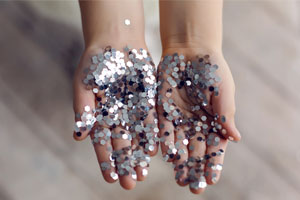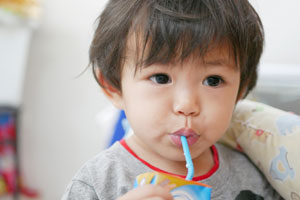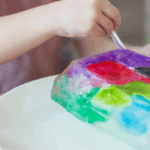
Reducing plastic waste and single-use plastic at nursery
Plastic, plastic everywhere… early childhood consultant Sue Asquith takes a look at ways you can reduce single-use plastic and plastic waste at your childcare setting.

The (BIG) plastic problem
Everyone has heard of the 2018 BBC documentary Blue Planet 2, and how it showed the devastating and increasing impact of plastics on our planet, right?
The UK produces up to a whopping 5.2 million tonnes of plastic waste every year! Some of this plastic is difficult (or too expensive) to recycle and shipping it abroad is just not sustainable.
Unfortunately, it’s no surprise that if you take a walk on the beach as the tide goes out, it is likely you will see lots of rubbish left on the beach. Now you may be nodding at this, but I guess you are also asking ‘what has this to do with my work in the early years?’
Well, we all have a part to play in ensuring that our world is sustainable and fit for future generations. And as an early years professional, you could start by reflecting on your practice and teaching children about looking after our environment.
How could nurseries be contributing to it?
Just take a moment to stop and think about your use of single-use plastic, personally and at work.
How about the packaging of your lunch? Do you use styrofoam boxes, cling film, plastic single-use cutlery. And how about your carrier bags?
And what about at nursery, glitter, nappy bags, plastic or vinyl gloves, plastic aprons, single use carton drinks with straws (and the plastic wrapping the straws), nursery milk, bottled water? I could go on.
Did you know that some of these plastics, for example, black plastic ready meal trays and cling film, are either non-recyclable or too complicated and expensive to recycle?
How can you reduce your nursery’s contribution?
Art and crafts
Have you ever taken a minute to consider the impact that even just glitter could have on our planet? Did you know that tiny particles of glitter end up in the water system and into our sea and wildlife?
Could you reduce your plastic glitter use, or even better, find a biodegradable alternative? You could even make your own by using a hole-punch and autumn leaves, for example.
What about wrapping and craft paper? Make informed choices. Some wrapping and craft paper is recyclable but shiny/foil paper often is not and sometimes the thinner the paper, the harder it is to recycle. You could purchase brown paper on a roll, often as cheap as or cheaper than wrapping paper. Include your nursery children and have them decorate the paper themselves.
Nappy changing
There is a multitude of alternatives for your nappy bags, plastic gloves and baby wipes.
- You could invest in biodegradable nappy bags
- You can reduce the use of baby wipes by using face cloths to wipe hands and faces
- You could go back to basics such as using cotton wool to wipe babies.
As with washable nappies, there is of course the argument about the extra washing using cloths can cause, but it is worth weighing up all options all the same.
Nursery food
Consider how you purchase your fruit and vegetables:
- Is your nursery food sourced locally? Transporting food around the country impacts the environment too, sometimes trying to select seasonable food helps
- You could take your own mesh bags, bags-for-life or select paper bags to choose loose vegetables and carry your shopping
- Consider the packaging of the things you buy, try to avoid choosing over-packaged food and goods or move to fruit and vegetables that aren’t plastic wrapped
- Is purchasing milk in glass bottles an option in your area, reducing your plastic bottle waste?
- Try to avoid single-use plastic cutlery, plates and bowls, and avoid plastic straws.
The best solution, of course, is to try to grow some of your own food with the children
It is so important that the children know where their food comes from; they can learn how to care for plants, new words and concepts all at the same time.

Bags
Although still plastic, bags-for-life and other re-usable solutions help to reduce the use of the thinner carrier bags which are often only used once and then thrown away.
If you have your nursery food delivered, you could ask for it packed into crates without being bagged. Then there are the good old non-plastic shopping bags (my Grandma had a pull along shopping trolley, which lasted for years)
Top tip: Consider your waste
Take some time over the next week to consider and list the single-use plastics and other waste at your nursery.
This can include things like baby wipes, gloves, bags and food packaging. Now, consider how you can replace or make more conscious purchasing decisions for each item.
Some of this may be unavoidable of course, but you could look at trying to reduce it.
All it takes is a bit more forward planning and conscious purchasing.
Remember, the children at your nursery are the next generation. We need to both look after our planet for the sake of their future, and ensure they know how and why we need to look after our planet for future generations.
Top tip: Make friends with your local florist
You could make confetti or sequin glitter alternatives by using a hole-punch and flower petals.
Florists throw away damaged flowers heads and possibly flowers if they are getting past their best.
If risk-assessed and age and stage appropriate, your nursery children can help make this too – perfect for extra learning opportunities
This blog post was written by early childhood consultant Sue Asquith.
- Eco-Friendly
Similar Articles
Top tips: Supporting your team’s well-being

Early years activity: Frozen balloon explorers


